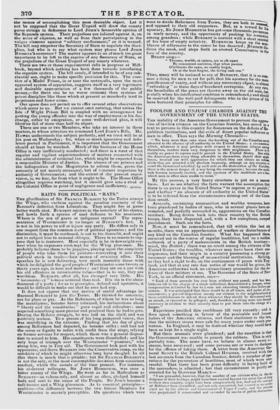BAITS FOR POLITICAL "RATS."
THE glorification of Sir FRANCIS BURDETT by the Tories annoy s the Whigs, who exclaim against the peculiar enormity of the Baronet's defection from Liberalism. They might fire at game better worth shot. BURDETT rejoices in the notoriety of his shame, and howls forth a species cf mad defiance to his assailants.
Where is the use of grave or indignant reproof? The repre-
sentation of Westminster is no longer at BURDETT'S feet. It is not in his power to aid or injure any party. He differs only in one respect from the common crew of political apostates ; and the distinction, it must be confessed, is not to his discredit, and ought not to subject him to unusual obloquy. There is no reason to sap. pose that he is insincere. Most especially is he in downright ear- nest when be expresses contempt for the Whig placeinen. He probably believes them to be jugglers, playing upon the simplicity of people who take them for patriots—converting it into their political stock in trade—their means of retaining office. The speeches he is now delivering, very much resemble those with which he delighted the good people of Westminster some twenty or thirty years ago, in tone and matter ; and they are on a par with his old effusions in ratiocinative value—that is to say, they are worthless. BURDETT, after all, has changed very little. His " inconsisteocy " is moie nominal than real. his sin is the aban- donment of a party ; for as to principles, defined and operative, it would be difficult to make out that he ever hod any.
It does not appear that any motive of sordid advantage in- fluenced BURDETT to join the Tories. He thirsted for notoriety, not for place or pay. As the Reformers, of whom he was so long the mouthpiece, became better informed, his declamations about " liberty and the constitution " grew vapid and ridiculous : men required something more precise and practical than he had to give. During the Reform struggle, he was laid on the shelf, and was pssitively useless. To a person of his long-pampered vanity, this was mortifying in the extreme. Finding that his day of glory among Reformers had departed, he became sulky ; and had not the sense or dignity to retire with credit from the stage, relying on former services for respect, which there was a general disposi- tion to accord to him. His constituents were dissatisfied; and his only hope of triumph over the Westminster " pismires," who stung him, was in Tory aid. The Government took part with his opponents; and drove BuanErr into the Conservative camp, on the outskirts of which he might otherwise long have dangled. In all this there is much that is pitiable; but Sir FRANCIS BURDETT'S is not the only, or the most contemptible deviation from consistent conduct, which the annals of the time present. For instance, his ci-devant colleague, Sir JOHN HOHHOUSE, was once a bitter enemy of the Whigs. He went as far in Radicalism as BURDETT—as vehemently, and almost as often, pledged himself body and soul to the cause of the People. Sir JOHN became a tuft-hunter and a Whig placeman. As to essential principles- realities—the difference between the two former Members for Westminster is scarcely perceptible. On questions which were wont to divide Reformers from Tories, they are both in elZ4 and opposed to their old supporters. But, as a reward for hi: apostaey, Sir JOHN HOEHOUSE has got some thousands per anner-e in ready money, and the opportunity of pushing his connesioe among grandees ; while BURDETT is content with a short renewal of his lease of empty notoriety. HOEHOUSE keeps up the km. blance of adherence to the cause he has deserted ; puRDEr, di,. dains the mask, and steps forth an avowed Conservative in the. face of the country. BYRON sings- " Thrones, worlds, et cetera, are so oft upset
By commonest ambition, that when passion O'erthrows the same, we readily forget,
Or at the least forgive, the loving rash one."
Thus, many will be inclined to say of Buanerr, that it is so eme. mon a thing for men to rat for pelf, that his apostaey for the mete gratification of vanity, and without any mercenary object, is almeg " refreshing " in these days of barefaced corruption. At any rite, the broadsides of the press are thrown away on the old man, (* pecially when his intellectual condition is remembered,) and should be reserved for the well-paid delinquents who in the prime of lib have bartered their principles for office.






















 Previous page
Previous page